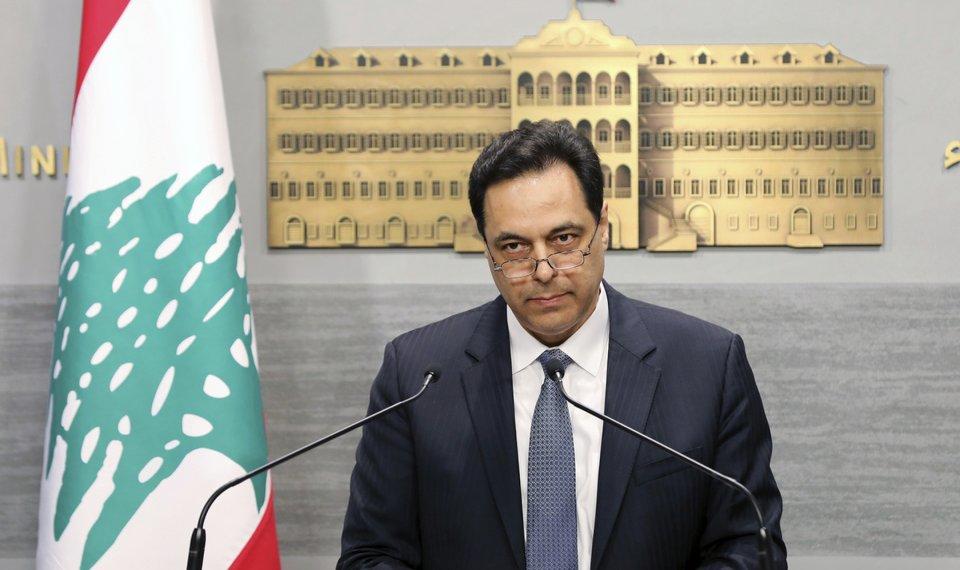
- ARAB NEWS
- 20 Apr 2024

For the first time in its history, Lebanon will default on its debt. Prime Minister Hassan Diab made the announcement on Saturday, saying: “How can we pay foreign creditors when the Lebanese can’t access their deposits?” He added that reserves had reached a “danger level.” Speculation was rife that it would come to this. The problem is that Lebanon is defaulting and it is alone — the country has no backing from the international community or the International Monetary Fund (IMF). Due to the objections of Hezbollah, which sees the IMF as a tool for American domination, a possible IMF intervention was rebuffed. Meanwhile, the international community is standing firm: It will not provide any aid unless reforms are conducted. The US and its allies do not see a difference between Hezbollah and the current government.
To start with, no one knows how much the central bank has in reserves, as it lacks transparency. Officially, the country had, as at the end of last year, $31 billion in reserves while owing $67 billion to banks, meaning the reserves are negative. Diab has announced reforms, saying they will save $350 million annually. However, this number will not really make a difference or save the economy from collapsing. Drastic reforms are needed. The Ponzi scheme that has kept the system afloat for the last three decades does not work anymore.
The government is also planning to negotiate with debtors. However, what kind of negotiations can take place if Lebanon does not have a guarantor. Without an IMF plan, it is very hard to convince debtors of reforms, especially with a country like Lebanon, which ranks 137th out of 180in terms of corruption. Now that the country is bankrupt, opening letters of credit to facilitate imports is becoming increasingly difficult, especially as Lebanon’s imports are more than five times its exports. Former Prime Minister Saad Hariri called on friendly countries to open lines of credit to Lebanon for essential goods, but his call was not answered as the international community has lost trust and patience with the corrupt and failing political elite. Last month, a visit by the IMF to offer technical advice resulted in no developments. The government did not have a plan and expected the IMF to give it a magic spell that would solve the country’s problems without formally interfering.
Lebanon’s middle class is becoming poor. The US dollar reached a record high of 2,700 Lebanese pounds last week and is expected to increase further, leading to a huge increase in the price of goods. Hyperinflation will drive people on to the streets. However, this time it will be violent, as people are hungry and angry. The government of Diab is on life support, and the important question remains: What’s next? No one seems to have a plan to take Lebanon out of its crisis. Unlike Greece, Lebanon does not have anybody ready to bail it out. To add to the calamity, the current leadership is stubborn and in denial.
Hyperinflation will drive people on to the streets. However, this time it will be violent, as people are hungry and angry.
Dr. Dania Koleilat Khatib
One option would be for corrupt politicians to try to buy the people, as they do at the time of elections. They could use the wealth they have accumulated from pillaging the country for the past three decades to buy people’s loyalty. This way, they could regenerate their legitimacy for a while. However, the government is unable to offer basic services. In the regional context, the stability of Lebanon is paramount, but the current political configuration cannot offer stability. A skyrocketing dollar value and an ever-shrinking dollar supply in a highly dollarized economy is a huge problem. Additionally, inflation will wipe out people’s safety net in a country where the government does not offer any real social protection.
It will be important to see what Hezbollah does. Will it act like a militia, as it has since the beginning of the protests, and seek to intimidate and use force to strangle the calls for reform, or will the situation be too much and it will stay on the sidelines? There are many issues with the reforms. The reforms will mean controlling the porous borders with Syria, the airport and the ports. Even if Hezbollah is allowed to keep its arms in the south, it will be highly restricted and this is something the group won’t accept easily. Secretary-General Hassan Nasrallah has previously warned that the protests could lead to civil war. However, a civil war is not in Hezbollah’s interest, just as it is not in the interest of any other political faction in the country. Sooner or later, Hezbollah will have to accept the IMF and its restricting conditions. Until then, Lebanon is faced with gloomy prospects, and there is no official plan to be put in place to lift the country from its current plight.